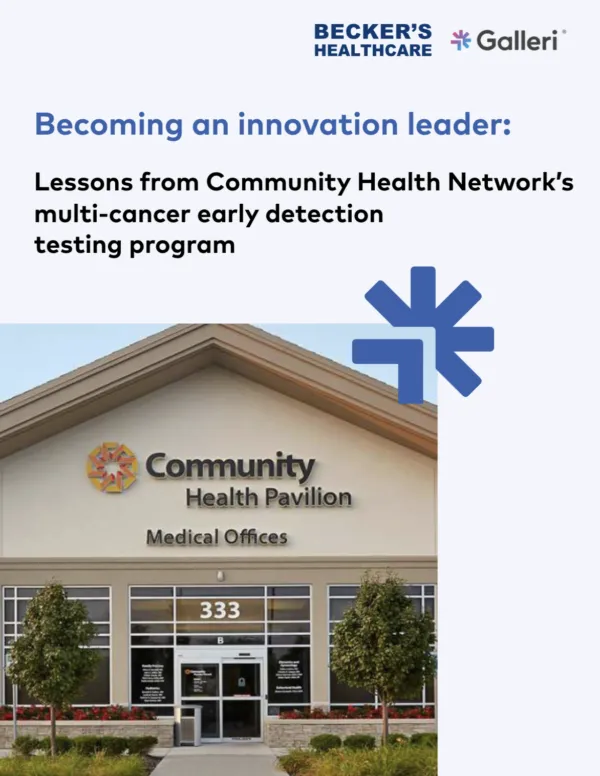Fill out your details to get FREE access to the case study now!
Additional details about the report can be found beneath the form.
Get the Case Study
By submitting this form, you agree to GRAIL’s use of this information to contact you, including for marketing purposes. Please do not include any sensitive or confidential information, including health information. For more information, please refer to our privacy notice.
Becoming an innovation leader:
Lessons from Community Health Network’s multi-cancer early detection testing program
Becker’s Hospital Review spoke with Patrick McGill, MD, MBA, Community Health Network’s executive vice president and chief transformation officer, to learn about the health system’s journey as an oncology innovator and decision to implement Galleri®️ multi-cancer early detection testing.
Learn how Community Health Network:
- Bolstered its commitment to innovation with improved cancer care
- Vetted the Galleri test, both clinically and financially
- Identified key aspects of launching a successful MCED program: educating providers, building in alerts, and centralizing support
- Approached the paradigm shift of screening for multiple cancers at the health system*
*The Galleri test should be used in addition to healthcare provider recommended screening tests.

“We found Galleri to be a relatively low investment for our health system compared to the impact it could have for our patients.”
—Patrick McGill, MD, MBA
Executive Vice President and Chief Transformation Officer
Community Health Network

The Galleri test is recommended for use in adults with an elevated risk for cancer, such as those age 50 or older. The test does not detect all cancers and should be used in addition to routine cancer screening tests recommended by a healthcare provider. The Galleri test is intended to detect cancer signals and predict where in the body the cancer signal is located. Use of the test is not recommended in individuals who are pregnant, 21 years old or younger, or undergoing active cancer treatment.
Results should be interpreted by a healthcare provider in the context of medical history, clinical signs, and symptoms. A test result of No Cancer Signal Detected does not rule out cancer. A test result of Cancer Signal Detected requires confirmatory diagnostic evaluation by medically established procedures (e.g., imaging) to confirm cancer.
If cancer is not confirmed with further testing, it could mean that cancer is not present or testing was insufficient to detect cancer, including due to the cancer being located in a different part of the body. False positive (a cancer signal detected when cancer is not present) and false negative (a cancer signal not detected when cancer is present) test results do occur. Rx only.
The GRAIL clinical laboratory is certified under the Clinical Laboratory Improvement Amendments of 1988 (CLIA) and accredited by the College of American Pathologists. The Galleri test was developed — and its performance characteristics were determined — by GRAIL. The Galleri test has not been cleared or approved by the Food and Drug Administration. The GRAIL clinical laboratory is regulated under CLIA to perform high-complexity testing. The Galleri test is intended for clinical purposes.